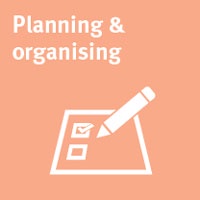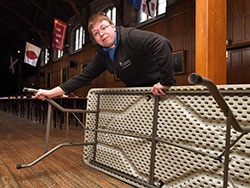- Benefits
-
Upon completion of the programme, Project SEARCH graduates will have gained over 800 hours of work experience in a variety of fields and are ready to enter the workplace as confident individuals, willing and eager to make a valuable contribution to your organisation.
Project SEARCH is so successful because it teaches each Intern skills through complex job coaching within the context of a real working environment. This means that they are able to make the transition quickly from student to employee when they enter your organisation. The support from the Project SEARCH team and other University colleagues during the programme has enabled the Interns to gain an understanding of the social complexities of the working world, such as how to interact with colleagues on a social level e.g. through sharing breaks and lunch times, as well as to develop sought after skills in the labour market - making them prime talent for organisations to employ.
Recruiting an Intern can also contribute to the personal and professional development of existing staff within your organisation. The Project SEARCH team can offer bespoke disability awareness training to organisations which recruit an Intern.
There are also a number of financial incentives available from the government to encourage organisations to employ young people, particularly those with disabilities.
Transferable Skills / Skills Development
Over the course of the Project SEARCH year, interns not only learn and develop practical work based skills but several transferable soft skills, adaptable to all environments.






- Interviews
-

There are simple, small and reasonable adjustments that could be made to level the playing field for interns during an interview. Such adjustments could be as simple as the following:
- Tell the Intern the names and roles of all interviewers from the outset
- Give the Intern as much detail as possible about the interview in advance (either by letter/email or in a telephone call) e.g. the precise location of the interview (including room number), floor level, even a building floor plan or photograph of the interview room
- Try to avoid asking open questions where possible as the Intern may find them vague and find it difficult to answer
- Base questions on past experiences the Intern has listed on her/his application form or CV rather than hypothetical situations. For example: "Tell me about the time when….." rather than "What would you do if…"
- Allow lots of time for the Intern to answer questions, to help them process information and plan an answer
- Do not ask more than one question at a time to avoid confusion
- Be aware that if the Intern has an ASD, they may take your words literally e.g. "I'm just going to run along the corridor to visit…"
- Some Interns may struggle to judge how much information they are required to give to answer a question and talk too much about a single topic. In such circumstances, it is fine for you to cut them off and move on - just simply let them know that they have answered your question
- Alternatively, be prepared to prompt the Intern to extract appropriate information if they have not yet given a full answer
- Be aware that Interns may make little or no eye contact
- Be aware that some Interns, particularly those with an ASD, may display certain repetitive mannerisms/behaviours, which can act as a comfort to the individual during a stressful situation.
These are only a few tips for interviewing Project SEARCH Interns, and all of the points will not necessarily apply in every case. It can be very difficult to read how a person might handle certain situations or questions, especially before meeting them, but the Project SEARCH team will be happy to provide insight and guidance ahead of an interview with one of our Interns.
Please contact us if you receive an application mentioning Project SEARCH, and together we can put any necessary and reasonable adjustments in place ahead of the interview.
- Alternative Interviews
-
Type of Interview
The type of job related tasks
Standard interview
A standard interview would suffice; just remember to make the simple allowances and adjustments that the intern may require.
- Customer facing
- Strong verbal communication required
- Team work from the outset
Interview and task trial
This would be a great way for interns to display their skills rather than just being required to discuss their skills and experience.
- Lone working
- Ability to follow instructions
- General IT skills
- Administrative tasks
- Tour of work space
Short-term work trial
A one to five day work trial which would allow interns to learn a complex skill before being judged on their job performance.
- Opportunity to demonstrate a range of tasks over a typical work day
- Learn to perform a complex task
Long-term work trial (4 weeks/external internship)
Up to 4 week work trial, which would allow interns to learn several complex tasks, requiring repetition to be learned.
- Provides an opportunity to demonstrate several complex job tasks
- Allows time to fit into an established team
- Would suit a role offering on the job training
- External Internships
-
Some more work-ready Interns are able to undertake external Internships in the third block of internships (mid-April to June). These placements give the Interns more confidence and independence in the workplace, while still having the protection and support of being on the Project SEARCH programme.
An external Internship could be treated as an extended work trial if you felt there could be a possibility of recruiting the Intern to a position within your organisation upon its completion.
The hours and days of work can be flexible and do not necessarily have to match the length and hours of a University internal Internship (normally 10.00am until 2.30pm Monday to Friday for 10 weeks). The Internship could also be undertaken on a part-time basis, alongside a University placement.
If you are interested in finding out more information about offering an external Internship, please contact the Project SEARCH team.
Eden Scott has had the genuine pleasure in supporting Project SEARCH over the last 18 months in providing hands on support and guidance to the interns.
What I have found to be highly impressive and refreshing, is not only the genuine desire of the Interns to do well and improve, but equally the level of responsibility they have in their placements and their efforts in performing to the best of their ability. The growth both personally and professionally that Project SEARCH provides is invaluable in assisting the interns in reaching their work ready goals and we are proud to have been part of the journey."
Lucy Nicoll
(Divisional Manager for Accountancy & Finance, Eden Scott) - Health and Safety
-
Employing any young person, including those with additional needs, is straightforward and should not result in cumbersome bureaucratic or expensive processes. You can use your existing risk assessment arrangements to assess and manage work place risks to Project SEARCH Interns in the majority of cases - there is rarely a need to do anything separate or new.
The Project SEARCH team will meet with you in advance of the Intern taking up their position and will be able to give you information about their skills, abilities and any needs that need to be taken into account before they start work.
After this meeting, a review of your risk assessments for the Intern should be undertaken and any additional requirements to your existing risk assessment process should be kept in proportion to the working environment:
- In low-risk environmentse.g. offices or shops, there will be everyday risks that will mostly be familiar to the Intern so your existing arrangements for other employees should be sufficient
- In environments where the Intern may be less familiar with the types of risks they will encountere.g. light assembly or packing facilities, you will need to ensure that there are appropriate arrangements in place for managing their induction, supervision, machinery/equipment training and protective clothing (as you would with any other new employee)
- In higher risk environments e.g. construction, agriculture, manufacturing, you will need to give more detailed consideration to the risks involved in the work and satisfy yourself that the instruction, training and supervisory arrangements have been properly thought through and that they work in practice. If there are specific factors within your working environment (e.g. radiation, hazardous substances or extreme temperatures) you should review your normal risk control measures that are already in place and consider if any additional protections need to be included. The Project SEARCH team will support you in doing this.
Your local Health & Safety representatives can also play a valuable role in helping your new employee settle into their working environment and supporting their ongoing training.
Further information from the Health & Safety Executive is available online at:


